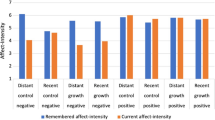Abstract
Many clinical models emphasise the importance of sequential shifts in emotion-processing for recovery from emotional conditions. Experimental models of such sequential changes are not well developed. We present an experimental model to study growth in emotion-processing. This study employed a growth writing paradigm in which the participant begins with an exposure-writing method and progresses to one that explores current dysfunctional cognitions and then benefits gained from past experiences. A total of 93 student participants who reported a past upsetting experience along with significant intrusion and avoidance symptoms were recruited. Results suggested the growth model of writing led to more benefits than an unstructured emotion writing paradigm, as indicated by a reduction in anxiety and negative affect scores at 2 months follow-up. Results suggest the possibility of studying synergistic relationships between emotion-processes so that we can better describe the nature of sequential changes in emotion-processing.


Similar content being viewed by others
References
Brewin, C. (2003). Posttraumatic stress disorder: Malady or myth?. Yale University Press: London.
Bryant, R. A., Moulds, M. L., Guthrie, R. M., Dang, S. T., & Nixon, R. D. V. (2003). Imaginal exposure alone and imaginal exposure with cognitive restructuring in treatment of posttraumatic stress disorder. Journal of Consulting and Clinical Psychology, 71(4), 706–712. doi:10.1037/0022-006X.71.4.706.
Campbell, R. S., & Pennebaker, J. W. (2003). The secret life of pronouns: Flexibility in writing style and physical health. Psychological Science, 14, 60–65. doi:10.1111/1467-9280.01419.
Crawford, J. R., & Henry, J. D. (2004). The positive and negative affect schedule (PANAS): Construct validity, measurement properties and normative data in a large non-clinical sample. The British Journal of Clinical Psychology, 43, 245–265. doi:10.1348/0144665031752934.
Davey, G. C. L. (1997). Conditioning model of phobias. In Phobias: A handbook of theory, research and treatment. New York: Wiley
Davis, C. G., Nolen-Hoeksema, S., & Larson, J. (1998). Making sense of loss and benefiting from the experience: Two construals of meaning. Journal of Personality and Social Psychology, 75, 561–574. doi:10.1037/0022-3514.75.2.561.
Ehlers, A., & Clark, D. M. (2000). A cognitive model of posttraumatic stress disorder. Behaviour Research and Therapy, 38(4), 319–345. doi:10.1016/S0005-7967(99)00123-0.
Ehlers, A., Clark, D. M., Hackmann, A., McManus, F., & Fennell, M. (2005). Cognitive therapy for PTSD: Development and evaluation. Behaviour Research and Therapy, 43, 413–431. doi:10.1016/j.brat.2004.03.006.
Esterling, B. A., L’Abate, L., Murray, E. J., & Pennebaker, J. W. (1999). Empirical foundations for writing in prevention and psychotherapy: Mental and physical health outcomes. Clinical Psychology Review, 19(1), 79–96.
Foa, E. B., & Kozak, M. J. (1986). Emotional processing of fear: Exposure to corrective information. Psychological Bulletin, 99(1), 20–35. doi:10.1037/0033-2909.99.1.20.
Frattaroli, J. (2006). Experimental disclosure and its moderators: A meta-analysis. Psychological Bulletin, 132, 823–865. doi:10.1037/0033-2909.132.6.823.
Guastella, A. J., & Dadds, M. R. (in press). Cognitive-behavioral emotion writing tasks: A controlled trial of multiple processes. Journal of Behavior Therapy and Experimental Psychiatry. Accepted 20 November 2007.
Guastella, A. J., & Dadds, M. R. (2006). Cognitive-behavioral models of emotional writing: A validation study. Cognitive Therapy and Research, 30(3), 397–414. doi:10.1007/s10608-006-9045-6.
Horowitz, M. J., Wilner, N., & Alvarez, W. (1979). The impact of event scale: A measure of subjective stress. Psychosomatic Medicine, 41, 209–218.
Janoff-Bulman, R., & Frantz, C. M. (1997). The impact of trauma on meaning: From meaningless world to meaningful life. In M. Power & C. Brewin (Eds.), The transformation of meaning in psychological therapies: Integrating theory and practice. Sussex, England: Wiley & Sons.
Lovibond, S. H., & Lovibond, P. F. (1995). Manual for the depression anxiety stress scales (2nd ed.). Sydney: Psychology Foundation.
Mathews, A., & Mackintosh, B. (2000). Induced emotional interpretation bias and anxiety. Journal of Abnormal Psychology, 109, 602–615. doi:10.1037/0021-843X.109.4.602.
Pennebaker, J. W., & Beall, S. K. (1986). Confronting a traumatic event: Toward an understanding of inhibition and disease. Journal of Abnormal Psychology, 95(3), 274–281. doi:10.1037/0021-843X.95.3.274.
Pennebaker, J. W., & Francis, M. E. (1996). Cognitive, emotional, and language processes in disclosure. Cognition and Emotion, 10(6), 601–626. doi:10.1080/026999396380079.
Pennebaker, J. W., Kiecolt-Glaser, J. K., & Glaser, R. (1988). Disclosure of traumas and immune function: Health implications for psychotherapy. Journal of Consulting and Clinical Psychology, 56(2), 239–245. doi:10.1037/0022-006X.56.2.239.
Resick, P. A., & Schnicke, M. K. (1993). Cognitive processing therapy for rape victims: A treatment manual. New York: Sage Publications.
Rowe, M. K., & Craske, M. G. (1998). Effects of an expanding-spaced vs massed exposure schedule on fear reduction and return of fear. Behaviour Research and Therapy, 36(7–8), 701–717. doi:10.1016/S0005-7967(97)10016-X.
Sloan, D. M., & Marx, B. P. (2004). Taking pen to hand: Evaluating theories underlying the written disclosure paradigm. Clinical Psychology: Science and Practice, 11(2), 121–137. doi:10.1093/clipsy/bph062.
Smyth, J. M. (1998). Written emotional expression: Effect sizes, outcome types, and moderating variables. Journal of Consulting and Clinical Psychology, 66(1), 174–184.
Wampold, B. E., Mondin, G. E., Moody, M., Stich, F., Benson, K., & Ahn, H. (1997). A meta-analysis of outcome studies comparing bona fide psychotherapies: Empirically, all must have prizes. Psychological Bulletin, 122(3), 205–215.
Watson, D., Clark, L. A., & Carey, G. (1988). Positive and negative affectivity and their relation to anxiety and depressive disorders. Journal of Abnormal Psychology, 97, 346–353. doi:10.1037/0021-843X.97.3.346.
Acknowledgments
This research was partially supported by the Australian Research Council. We would also like to thank Juliana Charlson for her assistance with data collection and Julia Carmody, Alex Howard, and Dean Carson for comments on this manuscript.
Author information
Authors and Affiliations
Corresponding author
Rights and permissions
About this article
Cite this article
Guastella, A.J., Dadds, M.R. Sequential Growth in Cognitive-behavioral Emotion-processing: A Laboratory Study. Cogn Ther Res 33, 368–374 (2009). https://doi.org/10.1007/s10608-008-9199-5
Received:
Accepted:
Published:
Issue Date:
DOI: https://doi.org/10.1007/s10608-008-9199-5



